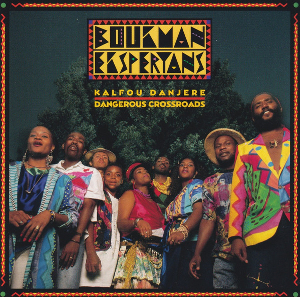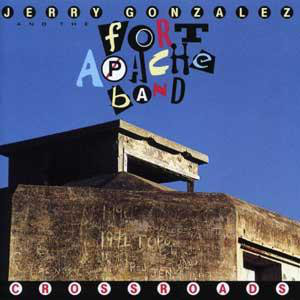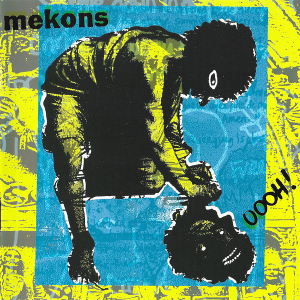
Senegal's music is best known abroad due to the popularity of mbalax, a development of conservative music from different ethnic groups and sabar drumming popularized internationally by Youssou N'Dour.

Orchestra Baobab is a Senegalese band established in 1970 as the house band of the Baobab Club in Dakar. Many of the band's original members had previously played with Star Band de Dakar in the 1960s. Directed by timbalero and vocalist Balla Sidibé, the group featured saxophonists Issa Cissoko and Thierno Koité, two singers, two guitarists and a rhythm section with drums, congas and bass guitar. Since their formation, the band has predominantly played a mix of son cubano, Wolof music, and to a lesser extent Mande musical traditions. Following the deaths of Cissoko in 2019 and Sidibé in 2020, Thierno Koité has become the leader of the band.

African popular music, like African traditional music, is vast and varied. Most contemporary genres of African popular music build on cross-pollination with Western popular music. Many genres of popular music like blues, jazz, salsa, zouk, and rumba derive to varying degrees on musical traditions from Africa, taken to the Americas by enslaved Africans. These rhythms and sounds have subsequently been adapted by newer genres like rock, and rhythm and blues. Likewise, African popular music has adopted elements, particularly the musical instruments and recording studio techniques of the Western music industry. The term does not refer to a specific style or sound but is used as a general term for African popular music.

World Circuit is a British world-music record label, established in London in the mid-1980s, that specializes in Cuban and West African recording artists, among other international music stars. The label's founding principle was to be an artist-led company with all aspects of each release tailored to the artist. This continues to be the label's way of working. World Circuit celebrated its 20th anniversary in 2006 by releasing World Circuit Presents..., a 2-disc retrospective compilation album. In 2018, World Circuit was acquired by BMG Rights Management.
Star Band is a music group from Senegal that was the resident band of Dakar's Miami Club. They, along with the many off-shoots of the band, are responsible for many of the crucial developments in Senegalese popular music. They were formed in 1959 by the owner of the Miami Club, Ibra Kasse. As was typical in Africa at the time, Kasse owned the instruments and was the band leader of the Star Band although he only occasionally played piano. Each one of the band's twelve albums released in Senegal featured a photo of Kasse on the back cover stating that he was the band leader, composer and arranger.

The Lion is an album by Youssou N'Dour, released in 1989. It was his first album to be distributed on a global scale.

Balla Sidibé was a Senegalese singer, bandleader, percussionist, vocalist and composer. A founding member of the popular vocal group Orchestra Baobab, Sidibé was responsible for composing many of the band's best known standards and is regarded by many, as the giant of African music.

Set is an album by the Senegalese musician Youssou N'Dour, released in 1990. The album in part inspired the Senegalese youth movement Set-Setal, which sought to beautify Dakar.

Beautiful Thing is an album by the American rock and roll musician Ben Vaughn, released in 1987. The album's final track, "The Apology Line", is covered on Barrence Whitfield's Ow! Ow! Ow!

Green Suede Shoes is an album by the American band Black 47, released in 1996. It was a commercial disappointment.

Kalfou Danjere is an album by the Haitian band Boukman Eksperyans, released in 1992. The title track, which translates to "Dangerous Crossroads", was banned in Haiti for its alleged subversive qualities. "Nwel Inosan" was also banned.

Very Greasy is an album by the American musician David Lindley, with El Rayo-X, released in 1988. It was Lindley's third studio album with the band.

Crossroads is an album by the American musician Jerry González, released in 1994. He is credited with his Fort Apache Band. The album was nominated for a Grammy Award for "Best Latin Jazz Performance".

Sol Negro is the debut album by the Brazilian musician Virginia Rodrigues. It was released in 1997. The album peaked at No. 7 on Billboard's World Albums chart.

Kindala is an album by the Brazilian musician Margareth Menezes. It was released in 1991. It reached the top 10 on Billboard's World Albums chart. Menezes supported the album with an international tour.

Don Dada is an album by the Jamaican musician Super Cat, released in 1992. It was his first album for a major label, and also one of the first dancehall albums for a major label. The album title refers to Super Cat's nickname.

Bambay Gueej is an album by the Senegalese musician Cheikh Lô. It was released toward the end of 1999, with an international release in 2000. Lô supported the album with a European tour.

Vini Pou is an album by the Guadeloupean band Kassav', released in 1987. It went gold in its first two weeks of release and was their first album to be widely distributed in the United States. Kassav', as a 16-piece unit, supported the album with a North American tour.

Rhythm People (The Resurrection of Creative Black Civilization) is an album by the American saxophonist Steve Coleman, released in 1990. He is credited with his band, the Five Elements.

OOOH! is an album by the British band the Mekons, released in 2002. It was inspired by a collaborative visual arts project sponsored by East Street Arts. The album marked the band's 25th anniversary. "Thee Olde Trip to Jerusalem" was released as a single. The Mekons supported the album with a North American tour.



















